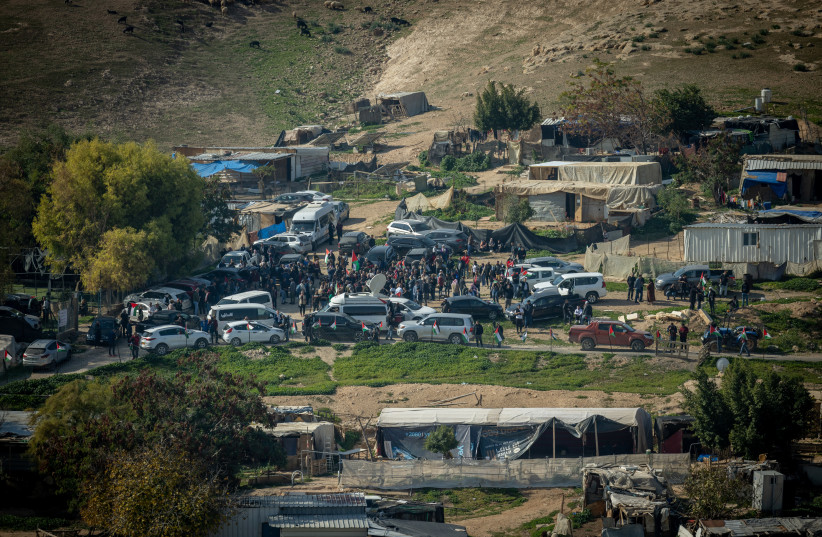Prime Minister Benjamin Netanyahu’s government is determined to evacuate the illegal West Bank Bedouin hamlet of Khan al-Ahmar but justices shouldn’t set the timetable for when that happens, the State Prosecutor’s Office told the High Court of Justice on Monday.
“The principled position of the upper political echelon is that rule of law requires the execution of the demolition orders against the Khan al-Ahmar compound,” the prosecutor’s office stated in its submission to the justices in advance of a May 1 hearing on the matter.
“The upper political echelon’s position... is that the timing and manner” by which the herding village would be razed, is impacted by a set of broad and diverse “political and security considerations,” the office stated.
The decision on when to act would also be based on confidential information that cannot be made public, it explained.
It, therefore, asked the court to dismiss the case and to allow the government rather than the justices to set the timetable for such an evacuation.

There is “no reason for the honorable court’s intervention in this complex and sensitive decision,” which should be determined by the upper political echelon, the prosecutor’s office said.
It noted that talks had been held in the past two years with the Abu Dahuk clan of Jahalin Bedouin that live in the village’s tents and huts, about relocating the hamlet to grazing land a short distance away from the existing compound.
The prosecutor’s office clarified on Monday that the plan had been dropped.
What's in store for Khan al-Ahmar?
The fate of Khan al-Ahmar has important symbolism to both the Israeli Right and Left, with the former believing that retaining the village in its current location endangers Israel’s ability to fold Area C of the West Bank into the country’s final borders. The Left and the Palestinian Authority believe that its presence on the edge of the E1 corridor near Jerusalem will help ensure that Area C will become part of the final borders of a Palestinian state.
The Abu Dahuk clan has explained that it arrived in the area of Khan al-Ahmar in the early 1950s after Israel expelled them from the Negev.
Khan al-Ahmar spokesperson Eid Abu Khamis said on Monday that he would comment on the state’s position only after he read the court’s submission.
The right-wing nongovernmental group Regavim, whose legal battle against Khan al-Ahmar began in 2009, filled the latest petition in 2019, asking the court to force the state to make good on its 2018 pledge to raze the village’s tents and huts perched on the edge of Route 1, just below the Kfar Adumim settlement. The Civil Administration has dismissed attempts to authorize those tents and huts.
Regavim rejected the state’s response stating that in refusing to set a timetable for the evacuation, it was aiding and abetting in the creation of a Palestinian state.
“Every state has its ‘silver platter,’ the sacrifice that makes the establishment of the state possible,” it said.
“Unfortunately, tragically, on the eve of Yom Hazikaron [Remembrance Day], when Israel remembers the sacrifice of our fallen, the silver platter that made the modern State of Israel a reality – the Israeli government has created the silver platter on which we will be handing the Palestinian Authority a state in the heartland of Israel: the illegal outpost known as Khan al-Ahmar.
Dan Turner, who lives in Kfar Adumim and who is part of a group Friends of the Jahalin that supports Khan al-Ahmar’s right to remain in its current location, said the state’s response was unfortunate, as was its decision not to engage in negotiations with the community to find an acceptable solution.
Khan al-Ahmar’s uncertainty about its future needs to end, Turner said. He added that a plan has to be drawn up to authorize the community, whose future should be dealt with in the same manner as that of the nearby Israeli settlements that were built after the Jahalin arrived.
There had been speculation that the initial response from the prosecutor’s office would call for the community’s authorization near its present location. To thwart such a possibility, Finance Minister Bezalel Smotrich, who also holds a ministerial post in the Defense Ministry, insisted that he be included in the discussion to draft the response as dictated by the coalition agreement. Netanyahu held a discussion on the matter with Smotrich, Defense Minister Yoav Gallant, Justice Minister Yariv Levin and National Security Minister Itamar Ben-Gvir on Sunday night.
